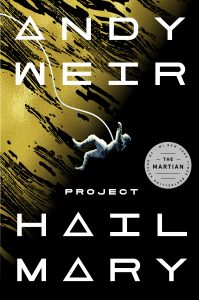Project Hail Mary successfully balances both the exploration of the mind and scientific processes.
 “Knock-knock-knock. No, that’s not creepy at all. Being in a spaceship twelve light-years from home and having someone knock on the door is totally normal.”
“Knock-knock-knock. No, that’s not creepy at all. Being in a spaceship twelve light-years from home and having someone knock on the door is totally normal.”
Ryland Grace, a junior high science teacher-turned-molecular biologist-turned-superhero, battles against time and himself to save Earth. On board the appropriately named ship, the Hail Mary, Grace must execute his mission of saving Earth from a calamity that, if not stopped, will bring the planet into a second Ice Age. With moral and political tensions rising, Grace begins to feel the relentless pressures of executing this mission as the ship, and the mission itself, come across unprecedented issues—all while keeping himself sane in isolation. That is––unless Ryland Grace isn’t as alone as he thinks he is in the vast galaxies of the universe. If there is someone out there, could they be the key to saving planet Earth? Or are they the ones who set out to destroy it in the first place?
Once again, award-winning Andy Weir—science fiction author of the bestselling novel The Martian—creates another near-perfect science fiction novel. His interpretation of a reluctant-man-turned-hero is believable and relatable, if not humorous. Filled with moral dilemmas and tough calls, Weir’s novel takes you on a mission that grapples with mankind’s capabilities and just how far humanity will take things to save themselves. Weir also creates believable communications between two species that live light-years apart, creating a relationship that could not be––forgive my pun––any more alien. An alien relationship, bound up via the language of science is a gripping relationship that keeps you rooting for it to succeed.
Through Project Hail Mary, Weir creates another piece of work for science buffs who desire to quench their curiosities. However, through Weir’s ability to break down the science jargon, the story can reel in those to whom scientific thinking does not come naturally. While this novel successfully balances both the exploration of the mind and scientific processes, there are ample opportunities to find engagement between the covers, no matter your interests.
I have never been inclined to pick up many science fiction books. However, it was serendipitous when this book fell into my lap via a book club, forcing me to read it. So, I took a seat, let out a breath, opened the pages, and thought, “Okay, let’s do this. What can it hurt?” What I had anticipated in the first fifty pages was slow pacing and disinterest, but I was pleasantly surprised to see just how wrong I was.
My expectations going into this novel were small, but Weir was able to convince me that there is so much more to science than just numbers and hypotheses. No, science is all-encompassing, and it pushes on the boundaries of the human mind, acting as a ripple effect, moving outside of numbers and through the many layers of the heart and mind. I am reminded of a quote from Project Hail Mary that reminds me of my transformation from a scientific skeptic to a scientific engager: “Human beings have a remarkable ability to accept the abnormal and make it normal.” For me, science fiction was a thing of abnormality. However, Andy Weir has shown me that this does not have to be the case. Instead, his work has proven to me just how easy and exciting it can be to allow an “alien genre” to become one of familiarity and normalcy. If Ryland Grace can float about in space and accept the abnormality, why can’t I?
—Review by Adrianna Samudio, Inscape Staff



